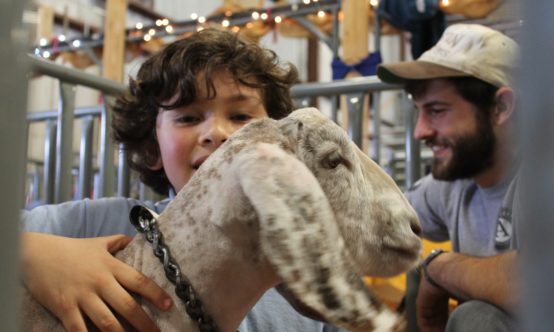At 4-H CAPITAL our youth learn about animal behavior, basic veterinary science, and animal nutrition as they care for goats, rabbits, and small mammals in an urban setting. As youth take responsibility for living things, they develop a strong sense of confidence and stewardship.
Our Goat Program is a big and popular program that houses 30+ goats at various elementary schools throughout Austin. The Goat Program provides our youth with an understanding and responsibility of raising and showing market Boer goats, ranging from goat healthcare, anatomy, nutrition and showmanship. Youth gain hands-on learning experiences in all aspects of the goat’s health; they learn how to monitor temperatures, administer injections, trim hooves and how to properly groom goats. Our youth participate in two goat shows – CAPITAL Classic, which takes place in December, and the Travis County Youth Show, which takes place in January.
At CAPITAL Classic, youth compete against our other goat schools in a mini show that allows them to familiarize themselves with showing goats. Several of our older Travis County 4-H and FFA youth participate and volunteer/mentor our students through the process. Families, ACE Site Coordinators, AgriLife Extension Agents, and AmeriCorps members work side by side to assure a successful competition.
The second and final show our youth participate in is TCYS, which is held in January. This is the overall project our youth and AmeriCorps members work towards in our Goat Program. Several of our youth compete amongst other Travis County participants, ranging from 3rd-12th grade, in the hopes that their goat can place in the overall show and enter auction.
Our Animal Science program is not only about goats but also an opportunity for our youth to learn about small mammals, reptiles, and insects. Youth engage through hands on activities about rabbits, guinea pigs, tarantulas, bearded dragons, animal dissections, animal behaviors and more. Youth learn about animal adaptations, internal and external structures, diets, habitats, enrichments, and the origination of these animals.
In several of our AISD campuses youth also participate in our Egg-to-Chick program, this helps them understand the life cycle, incubation process, and the anatomy of chickens (this also encourages our farm to table aspect of our curriculum for both goat & chicken)
“What will I be doing as an AmeriCorps Member on the Animal Science team?”
Our Animal Science AmeriCorps Members work together with our Animal Science Curriculum Specialist to assure the smooth roll out of the Animal Science program from M-F. AmeriCorps Members are also responsible to assure livestock and other animals are fed, maintained, and healthy throughout their term of service. Our Fall Goat Program is the busiest and most rewarding (working weekends but in tandem with the AS Specialist, Project Manager, and Program Director) and our members are expected to maintain goat pens and have a flexible schedule for our livestock animals/shows. However in the Spring our Animal Science program calms down as we enter our Egg-to-Chick Program. AmeriCorps members are expected to help assure the maintenance of chicken coops when our Egg-to-Chick program is in full swing.
*Some of our Animal Science schools will also have the opportunity to house or accommodate AmeriCorps Members to help in our Curriculum Enrichment Program – a program that gives our AmeriCorps Members the opportunity to teach hands on science activities in a school setting at the school they may serve.*
Essential Functions: Science Instructor Animal Science Team
- Inspire youth to develop into inquiring scientists, citizens of character, partners in service and engaged community members
- Be a positive role model and influence for elementary and middle school aged students
- Members will be working specifically with vulnerable populations.
- Plan, lead, and assist 4-H CAPITAL’s science curriculum in the after school space
- Develop proficiency in teaching and leading groups of youth of up to 16 students
- Implement proactive behavior management systems to ensure a safe and impactful teaching environment
- Working directly and caring for: Boer goats, chickens and other mammals
- Handling hay, farm shavings and other types of feed
- Assist with building and maintaining animal pens at partner schools
- Members will work a 9AM-6PM weekly schedule (40-45 hours per week) *AS Team with weekend hrs. to assure well-being of livestock*
- Assist in gathering and reporting data for evaluation purposes including daily attendance
- Willingness to work in an office environment that houses animals
- Working outdoors in various weather conditions with exposure to stinging insects, poison ivy, and other hazards

